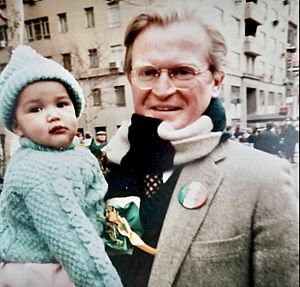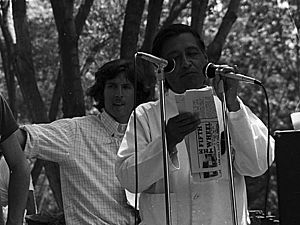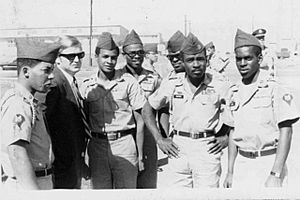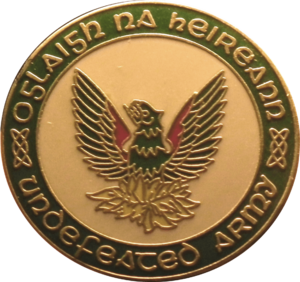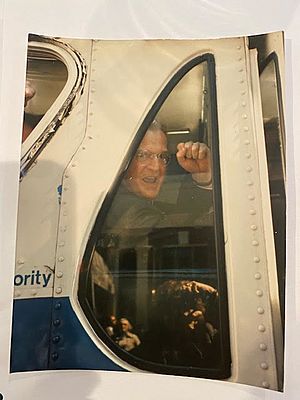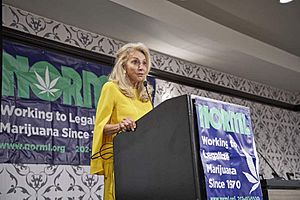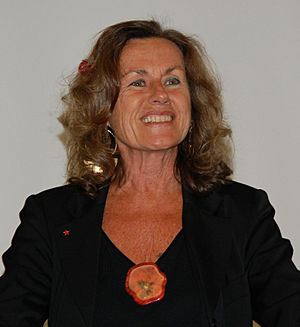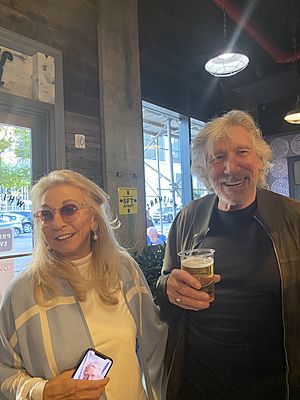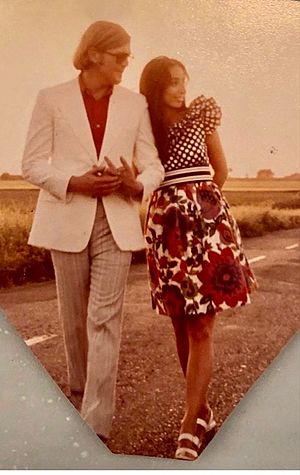Michael John Kennedy facts for kids
Quick facts for kids
Michael Kennedy
|
|
|---|---|
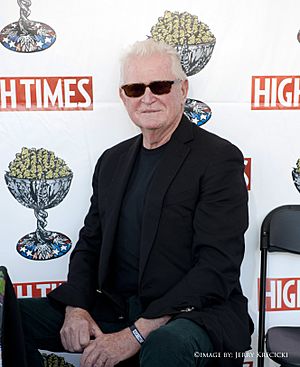 |
|
| Born |
Michael John Kennedy
March 23, 1937 Spokane, Washington, U.S.
|
| Died | January 25, 2016 (aged 78) Manhattan, New York, U.S.
|
| Education | University of California, Berkeley (BA) University of California, Hastings (JD) |
| Children | 3, including Scott |
Michael John Kennedy (March 23, 1937 – January 25, 2016) was an American lawyer. He was known for defending people's rights and freedoms. Michael Kennedy was an expert in U.S. Constitutional law. He worked for groups like the American Civil Liberties Union (ACLU). He also helped many people in his own law practice.
Kennedy worked as a lawyer for over 50 years. People knew him as a smart legal thinker. He always stood up for those who were treated unfairly. He also defended the right to speak freely, which is part of the First Amendment. He taught law at universities too.
He helped many famous people and groups. These included Huey P. Newton from the Black Panther Party. He also worked with Cesar Chavez, who helped farm workers. Kennedy even represented Ivana Trump in her divorce.
Contents
Early Life and Education
Michael Kennedy was born in Spokane, Washington. His parents were Thomas Kennedy and Evelyn Forbes. When he was four, he went to a special boarding school. He stayed there for more than ten years.
After high school, Kennedy went to college. He earned a bachelor's degree from the University of California, Berkeley in 1962. Later, he got his law degree from the University of California, Hastings College of the Law in San Francisco, California.
Career as a Lawyer
After finishing law school, Michael Kennedy started working as a lawyer. He often helped people for free. He took on many important cases about civil rights in the country.
Serving in the U.S. Army
In 1964, Kennedy was a first lieutenant in the United States Army. He often got in trouble for speaking against the war while in uniform. At an event for officers, he met Eleanora. She later became his life partner.
When he left the Army, Kennedy focused his law work. He defended people who refused to join the army during the war. He also helped groups who were not treated fairly.
Defending Rights and Freedoms
Kennedy was very good at jury trials. He focused on cases about the U.S. Constitution. This included human rights and civil rights. He knew a lot about laws concerning false statements and taxes.
He was also an expert on laws about privacy and police searches. These laws come from the Fourth and Ninth Amendments. He handled many cases about fair legal procedures. He also worked on cases about the right to a fair trial. This is part of the Sixth Amendment.
Kennedy could practice law in the highest courts. This included the Supreme Court of the United States.
Kennedy and another lawyer, Michael Tigar, created special programs. These programs were for the American Bar Association (ABA). They held a mock death penalty case at Alcatraz Federal Penitentiary. They also did a fake trial about human rights in Gaza and the West Bank. They even held a big meeting to investigate war crimes in Bosnia.
Important Civil Rights Cases
Michael Kennedy played a big part in the protests against the Vietnam War. He was one of a new kind of lawyer. These lawyers, like Kennedy, often worked for free. They helped people who were fighting for social change. Kennedy moved to New York in the late 1960s. He became a lawyer for the National Emergency Civil Liberties Committee.
1960s Cases
Helping Farm Workers with Cesar Chavez
Kennedy worked for the NECLC. He represented Cesar Chavez, a labor leader. Chavez helped start the United Farm Workers. Kennedy defended Chavez and farm workers. They were protesting high rents and bad living conditions.
Soon after, Kennedy helped with a successful strike in 1965. It was against a company selling non-union grapes and lettuce. This led to a five-year boycott of grapes. It became known as the Delano grape strike. This strike helped create the United Farm Workers of America. It was the first union for farm workers in the U.S.
The Fort Hood 43
A group of African American soldiers had just returned from Vietnam. They were told to help control riots at the 1968 Democratic National Convention in Chicago. Protests were expected after the assassination of Martin Luther King Jr.. The soldiers refused to go. They were then put on trial by the military.
Kennedy successfully defended this group, known as the Fort Hood 43. One of his clients, Sgt. Robert D. Rucker, later became a lawyer. He then became a judge on the Illinois Supreme Court.
The Chicago Seven Trial
The Chicago Seven were accused of planning riots. These riots happened at the 1968 Democratic National Convention. Kennedy defended Rennie Davis. Kennedy and three other lawyers were briefly put in jail. This was for showing disrespect to the judge. But all these convictions were later overturned.
The trial lasted five months. It was called one of the "most unusual courtroom events" in U.S. history. The judge issued many citations for disrespect. All seven defendants were found not guilty of planning riots. But they were found guilty of intending to riot.
House Un-American Activities Committee Hearings
After the 1968 Democratic Convention, some people were called to appear before the House Un-American Activities Committee (HUAC). Michael Kennedy was one of their six defense lawyers. The NECLC saw these hearings as an attempt to justify the police actions during the 1968 convention.
On the first day of the hearings, the accused and their lawyers protested. They stood together to show their opposition to the investigations.
Columbia University Protests
Kennedy represented students from Columbia Law School. They tried to shut down the law school. This was to protest the Vietnam War. Disciplinary hearings were held to expel them. Kennedy defended the students. The charges against them were eventually dropped. Some of these students later became lawyers and judges.
Supporting Gay Rights in the 1960s
The Committee for Homosexual Freedom (CHF) was a group for gay and lesbian rights. It started in San Francisco in 1969. Two activists, Leo E. Laurence and Gayle Whittington, were fired from their jobs. This happened after a photo of them together was published.
Laurence said he was fired for his "radical politics" and "union activities." Kennedy defended Laurence's case. He argued that it was unfair discrimination against homosexuals. He also said it was an attack on freedom of speech and press.
1970s Cases
During the Vietnam War, Kennedy defended many people. These included those who refused to fight. Some chose prison instead of fighting in a war they thought was wrong. Others went to Canada. Kennedy even traveled to Sweden to represent people the U.S. wanted back.
Andy Stapp and Dennis Ciesielski
Kennedy defended Andy Stapp. Stapp was an anti-war activist. He started a union for U.S. military members who opposed the Vietnam War.
In 1968, Kennedy handled the case of Dennis Ciesielski. He was the first U.S. sailor to refuse orders to serve in Vietnam. Ciesielski was accused of leaving his post. He was found guilty of a lesser crime.
The Buffalo Nine
The Buffalo Nine were students from the University at Buffalo. They sought safety in a church in Buffalo, New York. U.S. Marshals and police stormed the church. Bruce Beyer, a student leader, was arrested with eight others. They were accused of avoiding the draft and attacking an officer.
Their arrest got national attention. Kennedy, working for the NECLC, represented them. Former U.S. Attorney General Ramsey Clark also helped. Beyer, who faced a lot of jail time, left the country. He went to Canada and then Sweden, where he was given humanitarian protection.
Puerto Rican Draft Resisters
In Puerto Rico, Kennedy represented Edwin Feliciano Grafals. Grafals was a student who refused to join the military. He was part of a group that wanted Puerto Rico to be independent. Grafals and other Puerto Ricans felt it was unfair to be forced into the U.S. military. They argued that Puerto Ricans had no voting rights in the U.S. and no representation in Congress.
Kennedy moved to Puerto Rico with his wife, Eleanora. He represented Grafals and trained local lawyers. The judge ruled in favor of Kennedy's client. The judge said Grafals honestly believed the draft law was not fair for Puerto Ricans.
Freedom of Speech at Stanford University
H. Bruce Franklin was a professor at Stanford University. He was a strong critic of the Vietnam War. In 1972, he was fired from Stanford. The university said he encouraged protests and riots.
Franklin and Kennedy argued that his actions were free speech. But the university decided to fire him. The ACLU took the case to court. After eight years, the court sided with the university.
Challenging Views on Race
Dr. William B. Shockley was a Nobel Prize winner from Stanford University. He caused a lot of controversy. He believed that Black people were naturally less intelligent than white people.
His views led to many protests from students. In 1972, students entered his classroom to challenge him. Shockley called the police. The students were expelled by Stanford. Kennedy represented some of these students in court. But the university's decision stood. Shockley continued teaching, but his public talks were greatly reduced due to protests.
1980s–1990s Cases
Irish Republican Army Case
Five Irish men in New York were accused of sending weapons to the Irish Republican Army (IRA). Michael Kennedy and a team of lawyers won the case for them in 1982. Their defense showed that the U.S. Central Intelligence Agency (CIA) had been involved.
The lawyers argued that the CIA was helping the IRA get weapons. This was to watch the flow of arms to Ireland. It also prevented the IRA from getting weapons from the Soviet Union. The jury agreed. All five men were found not guilty.
The CIA stayed quiet about this until 2017. Then, secret information was released. It showed that Kennedy's team was right.
Nicaragua and the Sandinistas
Kennedy was against the U.S. interfering in Nicaragua. He opposed U.S. support for the Contras. The Contras were fighting to overthrow the Sandinista government. Kennedy was a legal advisor and friend to the Sandinistas. He was arrested several times in New York. This was for protesting the U.S.-funded war against the Sandinistas.
Nicaragua vs. U.S. in World Court
Kennedy was a legal advisor for Nicaragua in a big court case. It was called The Republic of Nicaragua v. The United States of America. The case was heard in 1986 at the International Court of Justice (ICJ). Nicaragua accused the U.S. of breaking international law. This was by supporting the Contras.
The ICJ ruled that U.S. support for the Contras was illegal. It demanded that the U.S. pay Nicaragua. The court said U.S. actions, like training the Contras and interfering with shipping, broke international law.
Northern Ireland Peace Efforts
Kennedy helped encourage U.S. officials to visit Northern Ireland. This was during peace talks with the British government. These talks led to the Good Friday Agreement (GFA) in 1998. This agreement helped end over 30 years of conflict, known as The Troubles.
Kennedy and his wife, Eleanora, took former U.S. Senator Robert Torricelli and Bianca Jagger to Belfast. There, they met Gerry Adams, a leader of the Irish Republican Army.
Work with the United Nations
Kennedy and his wife, Eleanora, were special advisors. They advised the President of the United Nations General Assembly from 2008-2009. This president was Father Miguel D'Escoto Brockmann, who was Nicaragua's former Foreign Minister.
Legacy and Media
Michael J. Kennedy Social Justice Award
The Michael J. Kennedy Social Justice Award was created by NORML. His wife, Eleanora, and daughter, Anna, approved it. The first award was given in 2016 to Gerry Goldstein, a lawyer and activist. In 2018, it went to Kennedy's friend, Michael Tigar. In 2019, the award was given to activist Bernardine Dohrn. Rock star Tom Morello presented it.
The award will also be given to the late Dr. Lester Grinspoon.
Documentary Film: Radical Love
Filmmaker William A. Kirkley met Michael Kennedy in 2016. Kirkley wanted to interview Kennedy for a movie. He ended up filming a long talk with Kennedy. This turned out to be Kennedy's last public interview. Kennedy passed away three weeks later.
Kennedy's story inspired Kirkley to make a new documentary. It's called Radical Love. The film is about Michael Kennedy's work in civil rights. It also tells the love story of Kennedy and his wife, Eleanora. The film includes interviews with Bernardine Dohrn and her husband Bill Ayers.
The film's producer is Caroline Waterlow. She is known for her Oscar-winning documentary O.J.: Made in America.
Radical Love first showed at the Tribeca Film Festival in New York City in June 2021. It was chosen to compete in the Short Documentary category.
The film was supposed to premiere at South by Southwest in 2020. But the COVID-19 pandemic caused the festival to be canceled.
Media Appearances and Archives
When making the 1990 film, Presumed Innocent, director Alan J. Pakula needed advice. He wanted an actor to learn from an experienced trial lawyer. Michael Kennedy was chosen to help actor Raúl Juliá.
Kennedy also performed in a play called Twelve Angry Men. He was one of eleven powerful lawyers in New York. The play raised money for scholarships for Legal Aid lawyers.
Michael Kennedy's papers and documents are kept at the New York Public Library. They are in the Manuscripts and Archives division.
Personal Life
Michael Kennedy was married to Eleanora (Baratelli) Kennedy for over 40 years. They had a daughter named Anna Kennedy. Michael also had two children from an earlier marriage: Lisa Marie Kennedy and Scott Hamilton Kennedy. Scott is a documentary film director who has been nominated for an Academy Award.
The Kennedys lived in New York City for many years. They spent summers in a large ocean-front house called "Kilkare" in Wainscott, Long Island. In winter, they stayed in a cottage in West Palm Beach, Florida. They also took long vacations at their stone house in Ireland.
|


